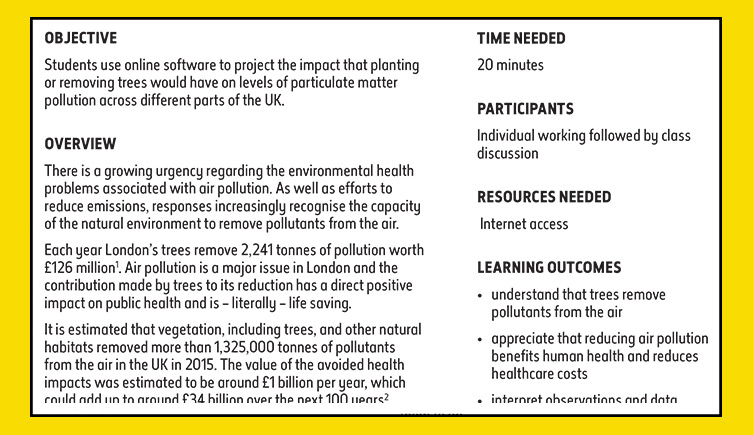Teacher notes
- Prior knowledge of photosynthesis is needed. The photosynthesis equation can be taught as a precursor to this activity. SCN 3-02a
Planet Earth
Biodiversity and Interdependence
I have collaborated on investigations into the process of photosynthesis and I can demonstrate my understanding of why plants are vital to sustaining life on Earth. SCN 3-02a
- Describes the process of photosynthesis (using the word equation) in terms of reactants (raw materials) and products.
- Applies knowledge gained from practical investigations to explain how green plants make their own food in the form of sugars and store this as starch.
- Investigates and presents information on how plants help to sustain life, for example, by providing oxygen, food, habitat, raw materials and medicines.
Biological Systems
Body systems and cells
I have explored the role of technology in monitoring health and improving the quality of life. SCN 3-12b
- Uses a variety of instruments to monitor and record aspects of health, for example, pulse rate, blood pressure and recovery rate and gives examples of other aspects of health that may be monitored, for example, cholesterol and BMI.
- Researches one condition that is screened for (for example, bowel cancer, macular degeneration and diabetes) and describes the symptoms of the condition.
Topical Science
Topical science
- I have collaborated with others to find and present information on how scientists from Scotland and beyond have contributed to innovative research and development. SCN 3-20a
- Collaborates with others to research how scientists, and those who use science in their jobs, have contributed to the development of scientific ideas.
- Communicates findings in a suitable way to give an example of how scientists contribute to innovative research and development.
- Gives examples of how skills developed through science are used in a wide variety of jobs and careers including science, technology, engineering and mathematics (STEM) careers.
Third Level Scientific Skills
Inquiry and Investigative Skills
Presents scientific findings:
- Presents data/information using an increasing range of tables, charts, diagrams and graphs and using suitable scales, with limited assistance
Carries out practical activities within a variety of learning environments:
- Collects increasingly complex data and information using a range of methods and equipment, for example, data and software analysis tools (where available)
- Includes a control experiment when appropriate in experimental design
Analyses, interprets and evaluates scientific findings:
- Relates findings to scientific knowledge and understanding
- Draws a conclusion based on results gathered and in relation to the aim
Scientific Analytical Thinking Skills
- Demonstrates further development of creative thinking including through the engineering processes of design, construction, testing and modification
Skills and Attributes of Scientifically Literate Citizens
- Demonstrates understanding of the impact of science on society and debates and discusses the moral and ethical implications of some scientific developments, demonstrating respect for the views of others.
- Expresses informed views about topical scientific issues, including those featured in the media, based on evidence and demonstrating understanding of underlying scientific concepts.
- Demonstrates increased awareness of creativity and inventiveness in science and the use of technologies in the development of sciences




